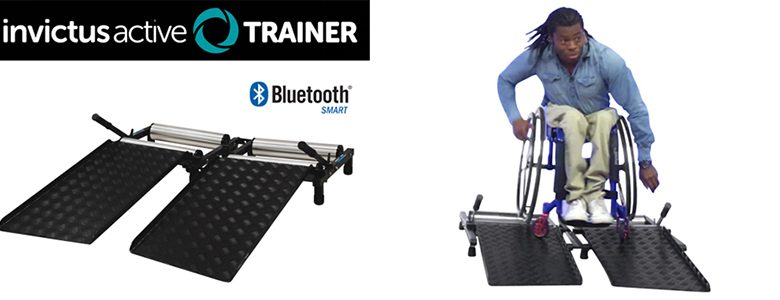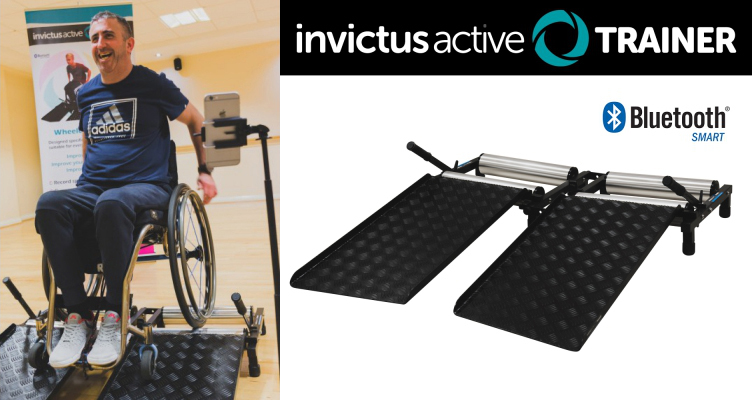
Wheelchair fitness machine that helps with fitness and weight loss
A lot of people know from personal experience how difficult it can be for wheelchair users to lose weight. But two entrepreneurs are now helping others after inventing a revolutionary fitness machine for wheelchair users.
Paul Cooksey and Scott Smith, both full-time wheelchair users, who met through a love of wheelchair tennis, are delighted with the impact their treadmill trainer has had on the lives of disabled people since being launched.
The duo, who run Invictus Active, was inspired to invent the Invictus Active Trainer as they wanted to enhance the lives of other disabled people.
Having both suffered spinal cord injuries and struggled to lose weight, they recognised the need to burn calories and shed the pounds, so they worked together on devising their own specialist machine.
It has quickly become popular with its users, attracting a string of five-star review. It has also been recognised by Sir Stelios Haji-Ioannou, the founder of EasyJet, who chose Invictus Active to receive a disabled entrepreneurs award after being impressed with their invention.
Its clever design means the Invictus Active Trainer can be used by any manual wheelchair user. A mobile app has also now been introduced which displays and records details of calories being burnt.
Paul, co-founder of Invictus Active, said: “I came up with the concept in my garage at home before Scott and I put our ideas together and developed the machine over a 12-month period.
“The response was quickly very positive. We were initially working with universities, spinal injury units and physios, but such was the feedback we then went to a leading disability show with a prototype and lots of people were trying it out. It’s snowballed really since then.”


With more than 1.5 million wheelchair users in the UK and around 50 million worldwide, Paul and Scott want to reach out to as many people as possible as they know the positive impact of the Active Trainer, which is manufactured in Droitwich.
“We’ve both got one at home,” said Scott, from Wolverhampton. “It connects to an app, so you can progress your work out and see how many calories you’ve burnt, how fast you’ve been going, or how far you’ve gone.
“Apart from weight loss, it’s also ideal for helping to improve balance and increasing muscle strength.”
Paul added: “It’s helped me lose five stone. I spend 30 minutes every day on it and doing that over a week, I will burn one day’s worth of calories as you burn about 300 calories in 30 minutes. You can quantify that with the app which accurately records the figures.
“Some people use the trainer because they’re looking to lose weight, some are looking to get better at sport while others might already be fit but they’re trying to get faster.”
It’s not only in the UK that the machine has made its mark as it has already been exported overseas to 15 countries, including Kenya, where it’s been used by a group for a case study, and South Korea.
Its simple to use, Paul added, was also part of its appeal: “It can be used by any manual wheelchair user, including children,” he said. “It’s ready to go straight out of the box. It folds out and you just put the ramps on, so it’s very easy to use.”
Scott, 29, whose background is in web design and marketing, has been in a wheelchair since he was nine owing to an incomplete spinal injury. He is now ranked seventh nationally in men’s wheelchair tennis.
Paul, 51, was paralysed from the neck down after a motorcycle accident 10 years ago. He had retired just four months earlier after selling his manufacturing business.
Invictus Active are now working in partnership with several universities in the UK and USA on further research programmes.
It is estimated that 68 per cent of the UK’s population is overweight, so machines like the Active Trainer have been welcomed by clinics and hospitals as a way to help people become healthier and to ease the strain on the NHS. Spinal injury hospitals and personal fitness trainers are snapping up the machines to be used by patients and clients.
“We just want it to enhance people’s lives and get them more active” added Scott. “Sometimes people aren’t as active as they could necessarily be and fitness plays a part in that. The trainer can definitely help in that respect.”
For more details, please visit www.invictusactive.com
By Invictus Active
Get in touch by messaging us on Facebook, tweeting us @DHorizons, emailing us at editor@disabilityhorizons.com or leaving your comments below.
More on Disability Horizons…